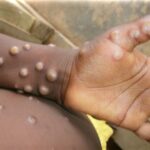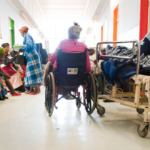- The health department will soon start to vaccinate four groups of people — men who have sex with men, sex workers, health and lab workers — against the monkeypox virus.
- These groups have a much higher chance than the general population to contract the virus and develop mpox.
- But the country has to depend on western European countries that have more stock than what they need donating their extra jabs, and not all types of mpox vaccines will work well in South Africa.
- By 15 June, South Africa had seven laboratory-confirmed mpox cases in three provinces (Gauteng, Kwazulu-Natal and Western Cape) of which two people died. All cases required have hospitalisation.
The health department will start to vaccinate four groups of people — men who have sex with men, sex workers, health and lab workers — with a much higher chance than the general population to contract the monkeypox virus, which causes mpox disease, as soon as donations arrive in South Africa.
Health Minister Joe Phaahla says shipments could make it to the country within days to weeks.
Mpox jabs, which will be stored at provincial health department depots, will be made available for free at health clinics, according to health department spokesperson, Foster Mohale. South Africa is sourcing jabs from Gavi, the Vaccine Alliance and western European countries that have more stock than they need.
[WATCH] Health Minister Joe Phaahla explains when mpox jabs will arrive
Because the monkeypox virus belongs to the same group of viruses as the one causing smallpox, people in South Africa who were vaccinated against smallpox are already protected against mpox.
The smallpox vaccine provides about 85% protection against getting infected with the monkeypox virus.
But, explains the National Institute for Communicable Diseases’ (NICD) chief medical scientist at its Centre for Emerging Zoonotic Diseases, Jacqueline Weyer, South Africa stopped smallpox vaccinations in 1980, as the illness had been eradicated, and therefore, only people of 45 and older would have received their shots.
People with mpox get a skin rash with blister-like bumps, along with symptoms like headaches, swollen lymph nodes, a sore throat, muscle ache and fever. It’s during the period that someone’s skin looks like this that they’re most contagious, as the fluid in the blisters contain a lot of the virus.
Most infections happen during skin-to-skin contact, in other words, when someone’s skin touches the blisters of an infected person’s skin, for instance, sex or kissing.
[WATCH] Jacqueline Weyer explains how severe mpox is in SA
On average, each person with mpox infects about one other person, says Weyer. (Scientists call this the basic reproduction number, or R0 value, which is a measure of how contagious a disease is; if the value is 1 or more, like for mpox, the disease continues to spread, while it can be thought of as controlled if the value is less than 1.)
The rate of infection, however, increased for a period in 2022 in western Europe, when a global mpox outbreak started. In that year, scientists estimated the R0 value in countries such as Germany and Spain to be between 2.4 and 2.8, meaning each infected person transmitted the virus to more than two other people.
Since 2022, mpox has spread to 118 countries, says the NICD. By May 2024, 95 912 cases had been documented from 118 countries.
[LISTEN] Most people with mpox in SA have HIV, but are not on treatment
South Africa recorded five cases in 2022 and none in 2023. But in May this year, mpox cases started to emerge again. Since then, over a period of six weeks, the country has recorded seven laboratory-confirmed mpox cases, of which two patients had died.
In theory, the country could therefore have at least six other mpox cases, if each infected person transmitted the monkeypox virus to one other, and those six cases could also have each infected one more person.
All South Africa’s cases are men between the ages of 30 and 39 from Gauteng and KwaZulu-Natal, most identifying as men who have sex with men and all with weakened immune systems because of (mostly untreated) HIV infection, according to the health department.
Weyer says all the men were, or have been, hospitalised, which means their disease is severe. One of the reasons, she says, why all cases were in their 30s, is because that is an age during which people have sex often (a lot of skin-to-skin contact occurs during sex) and it’s an age group too young to have been vaccinated against smallpox. This means people in their 30s have a higher chance to contract the monkeypox virus.
Weyers says: “Most cases in the other countries were also among men who have sex with men [who tend to] have strong social networks. In the United States there is data showing that many men who have sex with men and who are later diagnosed with mpox have had multiple sexual partners in a short period, which contributes to a larger scale and faster transmission of the virus.”
She says it’s not yet sure which brands of mpox vaccines South Africa will receive, but live, attenuated jabs will not work well for the country, because so many people here, particularly people with HIV who are not on treatment, have weakened immune systems. According to the Thembisa model, which estimates HIV infections, about one in four of South Africa’s estimated 7.8-million people with HIV — about two million people — are untreated.
Live, attenuated vaccines use the actual (live) virus that causes a disease, but a weakened form of it, to teach someone’s immune system to produce antibodies to protect them against the disease. In people with very weak immune systems, these jabs may, however, result in serious or fatal infections. Mpox vaccines such as the one known as ACAM2000 contain live viruses.
The four groups of people the health department plans to vaccinate, will amount to hundreds of thousands of people — if they all decide to get vaccinated. South Africa has over 340 000 health workers (these include both medical and non-medical staff such as cleaners and porters), of which about 212 000 are healthcare workers (medical staff, such as doctors and nurses).
The country’s public lab service, the National Health Laboratory Service, employs at least 8 000 people and South Africa is estimated to have between 131 00 and 182 00 sex workers; numbers on men who have sex with men in the country are hard to come by.
Meanwhile, getting treatment into the country is the health department’s immediate priority, says Mohale, who expects World Health Organisation-donated shipments of the antiviral drug, Tecovirimat, also known as TPOXX, within days. Although the drug isn’t registered with the country’s medicines regulator, the South African Health Products Regulatory Authority (Sahpra), a special arrangement, called a Section 21 approval, has been made to import a small stockpile for possible new mpox cases.
Mohale says the treatment will be made available for free in public hospitals.
Weyer explains: “Most people with mpox don’t need treatment or hospitalisation. But in severe cases, Tecovirimat is used to stop the virus from replicating in someone’s body, which is why it’s called an antiviral drug.
“The medicine is relatively new, so it’s unregistered in most countries. But steps are underway to secure access to additional doses of treatment [South Africa previously imported doses for some of the already recorded cases] for any further serious cases that might be found in South Africa in the coming weeks.”
[Update 15 June 2024, 10.20am] This story was updated to reflect an additional, seventh, mpox case reported by the health department on the evening of 14 June.
Mia Malan is the founder and editor-in-chief of Bhekisisa. She has worked in newsrooms in Johannesburg, Nairobi and Washington, DC, winning more than 30 awards for her radio, print and television work.







